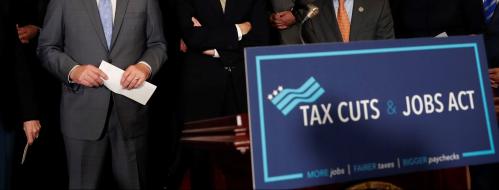One year ago, Brookings experts wrote a series of 12 memos to the incoming president on the most pressing policy issues facing the country. Now they assess the administration’s progress on those issues in The Status Report, a daily series of commentary with video to be featured in POLITICO’s Arena. William Gale and Benjamin Harris give the president a B, noting their approval of the administration’s aggressive use of tax and fiscal policy in pursuing the paramount goal of saving the economy—but also concern about the resulting lack of progress in efforts to reform the tax and fiscal system.
Tax Reform and Fiscal Policy: B
President Obama took office faced with a declining economy on the verge of collapse, a crisis that appropriately overrode many other policy concerns. His administration responded aggressively with a stimulus package that contained spending increases and tax cuts that were large, diversified and relatively prolonged over time.
We presented tax policy recommendations to the president-elect on December 4, 2008. This evaluation reflects his ability to achieve progress in tax and fiscal issues. We give the President an A on focusing on the key economic priority, a B+ for design of the stimulus package and an “incomplete” on tax reform and fiscal sustainability.
While the ultimate success of the stimulus package will be debated for years, we believe that the general structure of the plan was constructive. The stimulus plan needed to be large because the economic problem was enormous; diversified because it is not clear exactly what would work, and relatively prolonged because the economy looked to be weakened for several years. The Obama administration acted quickly and boldly in combating the economic downturn with fiscal stimulus, sending a message that it would actively use policy to right the economy. The Administration deserves credit for getting the economic priorities right and for stimulus design.
While the economic “free fall” has seemingly been averted and recovery has begun, the administration now faces the difficult task of helping the economy return to full strength while simultaneously addressing structural problems in the design of tax and fiscal policy.
Our advice last year focused largely on these structural issues. We encouraged the administration to implement a tax on carbon emissions or a “cap and trade” system for trading pollution permits. This would improve energy policy, reduce global warming, and raise revenue that could reduce pressure on the long-term budget deficit.
We encouraged Obama to address an unequal and increasingly expensive health care system by capping the tax benefit for employer-paid health insurance premiums and converting the benefit into a fixed, refundable credit.
On aggregate fiscal and tax issues, we recommended that the president bring the budget towards long-term balance by scaling-back tax expenditures and using the additional revenue to raise revenues and reduce marginal tax rates. We also recommended that the President modify the taxation of capital income; rationalize the array of deductions, exclusions and credits; and simplify taxes and improve administration.
The administration’s proposal for cap-and-trade focused appropriately on raising the price of carbon emissions, which would make America’s energy consumption more efficient and bring in new revenues to the Treasury. However, as the bill has wended its way through Congress, these features were largely stripped.
Health care reform was the perfect opportunity to replace the unlimited tax deduction for employer-paid health-insurance premiums with a fixed, refundable credit. One proposal moving through Congress would tax insurance companies that provide “Cadillac” health plans. This would help control rising costs, and is far superior to another proposal that would finance health care by raising tax rates on high-income households. But both alternatives are more expensive, more regressive and less effective than converting the tax deduction of health insurance premiums to a fixed, refundable credit.
One casualty of the year-long focus on the economic recovery has been the ability to develop plans for systematic tax reform and fiscal sustainability. While it is impossible to cut the short-term deficit while stimulating the economy, progress on medium- and long-term fiscal policy has been mostly absent—and sometimes negative—in the first year. The administration has proposed to extend almost all of the Bush tax cuts and to massively reduce the AMT, in each case without offering any proposal to pay for the changes.
The 10-year fiscal outlook is unsustainable. Likewise, there has been no real progress on the taxation of capital income or the use of tax expenditures. The president’s policies have justifiably made taxes more progressive, but they have also made taxes more complex; the most egregious example being the temporary elimination of the estate tax. Systematic tax reform and fiscal sustainability should address all of these issues in the coming year.
The Brookings Institution is committed to quality, independence, and impact.
We are supported by a diverse array of funders. In line with our values and policies, each Brookings publication represents the sole views of its author(s).










Commentary
The Status Report: Obama and the Tax System
January 7, 2010